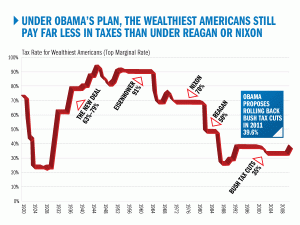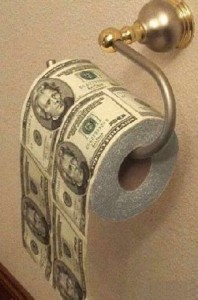 Last week the House passed a bill designed to claw back bonuses over $250K from recipients of TARP money.
Last week the House passed a bill designed to claw back bonuses over $250K from recipients of TARP money.
Now I’m a class warfare guy on the side of regular folks (as opposed to the rich, who are winning the current war and won the last one), but this bill is counterproductive and won’t work. It is too easy to work around and it is targeting the wrong people.
- The clawback only affects bonuses, leaving a loophole where TARP recipients can just recategorize bonuses as salaries.
- If the clawback applied to all income, then employees would be moved to contract status or to companies which haven’t received TARP money (even if artificial companies have to be created for the purpose).
- The threshold of $250K of household income is not that high, as Henry Blodgett points out. Don’t get me wrong, no family making that amount is poor, but they are still affluent. (I’ve never made anything close to it, so this isn’t a personal thing.) At the same time, they aren’t filthy rich, either, and they shouldn’t be taxed as if they were.
But concentrating on bonuses for employees at firms which have been bailed out misses the point. It’s not just those firms whose employees need to be taxed more heavily, it’s everyone.
The logic for increasing taxes is simple enough. For the last 20 years, American executives have been able to pay themselves such large bonuses that in 3 to 5 years they could amass enough money that hey would never need to work again. This executive compensation system created the incentive to do whatever was required in order to get those bonuses—leading to flagrant risk taking and outright fraud. It also led to a short-term focus on the business. When executives know that it doesn’t matter to their personal financial well-being if their firm exists in 5 years, they don’t worry about the long term consequences of their decisions. All that matters is booking “profit” now, so you can get money now, and become rich now.
Wall Street and the banks didn’t make any money in the last 10 years, for all that they booked record profits. The combined losses of the financial firms is larger than their entire reported profits. What they did was sell synthetic securities based on dubious assumptions about the future—that the housing bubble would continue forever, there would never be another recession, and defaults wouldn’t cluster; and book the entire calculated future profits of these securities as profit in the year they were created. Of course, those future profits were fictional, but the bonuses based on them were in real money.
In order to make sure this never happens again compensation needs to be restricted in every firm, not just in the US, but in the industrialized world. Executives and salespeople and auditors and loan officers (if banks decide to rehire any) need to know that ten years from now if a loan goes bad that they’re going to be on the carpet for it, that they might lose their job for it, and that they will still need a job in 10 years.
I recommend 7 measures to restrict compensation:

